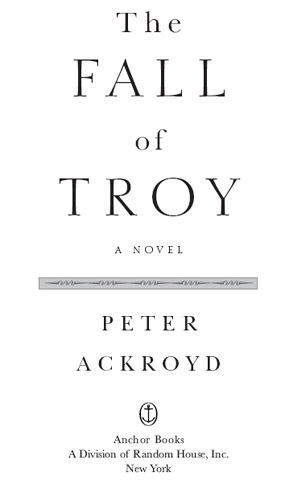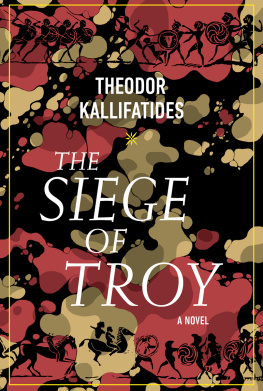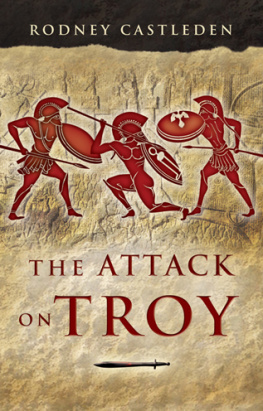

CONTENTS
ONE
H e fell down heavily on his knees, took her hand and brought it up to his mouth. I kiss the hand of the future Mrs. Obermann. He spoke in English. Neither she nor her parents understood German, and he disliked speaking demotic Greek. He considered it vulgar.
Sophia Chrysanthis looked down at his bald head, and noticed a small scar. You have been wounded, Heinrich.
A fragment of the statue of Zeus. On the island of Ithaca. That is where I found the palace of Odysseus, the wanderer. I discovered the chamber where his wife, Penelope, had woven her endless tapestry. She was always faithful to him. You will be my Penelope, Sophia.
I hope you do not travel as far as Odysseus.
You will never leave my side. He rose, with difficulty, and bowed to her parents, who were standing together by the window. I will utter prayers for you every day. If I live to be a thousand years old, I will never forget you. Outside, in the dusty light, the horses and carriages passed along the avenues; he glimpsed three women, holding up parasols to protect themselves from the bright sun of the early Athenian spring, chattering together as they walked upon the cobbles. They were dressed in pale green, with white veils and bonnets, and he knew at once that they were sisters. This is an auspicious day. Your daughter will be a partner in my labours. She will be cherished by Greece.
She has no greater desire than to be your wife, Herr Obermann. Madame Chrysanthis gave a slight nod, as if making some formal remark for dutys sake. We have taught her that a wife is but the shadow of her husband.
The women in Germany would not believe you.
That is why you are not marrying a German.
Obermann laughed. He already knew that Madame was a formidable woman, and he hoped that her daughter had inherited her sterner virtues. But my wife will be my partner in uncovering the lost past of her country. She will stand within the walls of Troy!
Sophia has a passion for learning. That is true. Colonel Chrysanthis deemed it necessary to enter the conversation: the future of his only child was, after all, being discussed. Ever since your first letter to us she has been reading Homer to me.
She draws up maps of the battle lines, Madame Chrysanthis said.
This is all good. All excellent. Obermann had once more taken Sophia by the hand. She is another Athene, as learned as she is beautiful.
I will not be a goddess, Heinrich.
I cannot wait to bring you to the plain of Troy. To show you the place where Hector and Achilles fought. To show you the palace of Priam. And the walls where the Trojan women watched their warriors in battle with the invader, Agamemnon, and his soldiers. It will stir your blood, Sophia.
It was a long time ago, Heinrich.
Not for me. It is eternal. Beyond time.
I do not know if I will be able to see so far.
My wife will see everything.

A FEW DAYS EARLIER he had led her into the courtyard of the house, cool in the shadows of the evening, and sat with her on the marble bench there. I must have you, Sophia. Once I have come to a conclusion I cannot be moved. I am unshakeable. As soon as I saw your photograph, I knew that I was yours.
So you chose me without reason?
We do things because we do them. There is no necessary explanation. Your Greek dramatists knew this. Homer knew it.
I thought that you wanted me because I am a woman who reads Homer.
That is a part of it. There we are already married. But there is also fate, Sophia. As hard and as desperate as life.

THE CEREMONY was conducted in the little church of Hagios Georgios, set back from the Odos Ermou in a small square, while the servants of the Chrysanthis household prepared the wedding feast. There was much discussion among them about the relative merits of bride and groom. The maids considered him too old for Sophia. She was in her mid-twenties, whereas Herr Obermann must be fifty, no, more than fifty. He would soon be stout, and he wore pebble glasses; he was short, too, with a great round head like a cannon ball.
He speaks too loud, Maria Karmeniou said. You can hear his voice booming through the house.
It is the German manner, Nikola Zannis explained. They are strong. Impatient.
The butler and the valet took his part. Miss Chrysanthis was youngand some even called her beautifulbut she had a shocking temper like her mother. She had been as sweet to him as the honey of Hybla, but they prophesied that this would not last long after the wedding night. It was agreed by all of them, however, that Herr Obermann must have paid a very large dowry for his new wife. And, for this, they were grateful. In recent months their employers had pared down costs so much that they had had little opportunity of cheating them.
The feast itself was lavish, of course, with all the sweet pastries and dainty confections that are usual on such occasions. Obermann drank a great deal of wine, and even called out for Bavarian beer; but there was none on the premises. Then before the meal was over, against all custom, he stood up and made a speech. He began by praising the beauty of Greek women, as exemplified by Madame Chrysanthis, who had presided over the most charming meal since Aphrodite dined with Zephyrus and the Nereides. Her consort, the great man Colonel Chrysanthis, the pride of the National Patriotic Army, who had fought so valiantly against the Asiatics, was especially worthy of praise; but he deserved most thanks for producing out of his powerful loins his most splendid daughter. Will you raise your glasses to the young lady whom I have the honour to call Frau Obermann? He picked up his own glass for the toast. She will be my comrade in the field. Thanks to the exertions of her parents, she is a lover of learning. She has been an admirer of the Homeric poems since her earliest childhood, and has expressed to me her heartfelt sympathy with my task. When I return to the plain of Troy, as I shall do very shortly, I shall take with me a blessing greater than the Palladion that protected the old city! At this point he began to recite from memory the passage of the Iliad in which the goddess, flashing-eyed Athene, in-stils courage and hope into the breast of mighty Diomedes. Only Sophia could understand a word of the ancient Greek. The others listened in perplexed silence as Obermann continued his oration.
When the meal was over, he danced wildly in the courtyard of the Chrysanthis house. Sophia stood with the other married women as he leaped into the air and threw out his arms, in imitation of the Turkish peasants whom he had seen in the small villages near Troy. He began to sweat dreadfully, and his bald head seemed to be melting in the rays of the afternoon sun. And Sophia thought, how can I love a man who dances so badly?
That night, after he and Sophia had retired to the marital chamberthe bed strewn with flowers, according to customthe servant on that floor was awakened by the sound of howling. She hurried down the corridor and put her ear to the door of the Obermanns chamber. The howling had stopped. But then she heard Herr Obermann singing, and there was a noise like that of feet banging on the wooden floor. She crossed herself, and went back to her room. She could not have known that this was a German marching song.
Next page



















